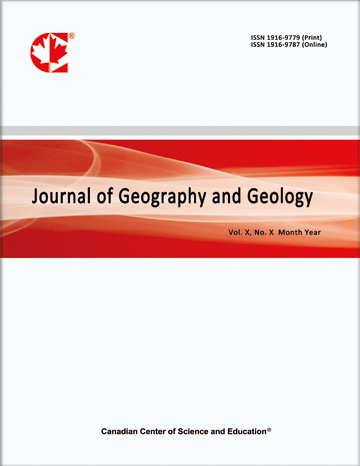Managing Land Use Transformation and Land Surface Temperature Change in Anyigba Town, Kogi State, Nigeria
- Ifatimehin Olarewaju Oluseyi
- Musa Salihu Danlami
- Adeyemi John Olusegun
Abstract
The uncontrolled urban growth in cities comes with unattending alteration in the urban environmental system. This alteration as land use types change is most responsible for some of the problems witnessed in urban town such as the variation in land surface temperatures over time. This study used Remote sensing and GIS techniques to identify, mark and measure the extent of the various land uses from the Landsat TM image of 1995 and Landsat ETM+ image of 2006. The study revealed that the spatial and temporal changes in the land uses have greatly influenced the increase in the land surface temperature of each of the identified land uses. As vacant land and built-up area increased by 3.28 ha/yr and 78.34 ha/yr so did their land surface temperature increased by 0.083oC/yr. While vegetation and water and wetland vegetation decreased, their respective land surface temperature increased by 0.075oC/yr and 0.083oC/yr. This increase in land surface temperature of the study area within the period of study suggest that the rise in temperature of the various land uses may encourage environmental problems associated with local climate change as heat waves and mosquito infestations which can cause human discomfort as its been witnessed today in Anyigba. Proper checks on the development and conversion of land uses, urban forestry and adequate planning if employed may help in managing this occurence from agravating other environmental problems associated with land uses change and climate change.- Full Text:
 PDF
PDF
- DOI:10.5539/jgg.v3n1p77
Journal Metrics
(The data was calculated based on Google Scholar Citations)
Google-based Impact Factor (2018): 11.90
h-index (January 2018): 17
i10-index (January 2018): 36
h5-index (January 2018): 13
h5-median(January 2018): 15
Index
- BASE (Bielefeld Academic Search Engine)
- Bibliography and Index of Geology
- CiteFactor
- CNKI Scholar
- Educational Research Abstracts
- Excellence in Research for Australia (ERA)
- GeoRef
- Google Scholar
- LOCKSS
- NewJour
- Norwegian Centre for Research Data (NSD)
- Open J-Gate
- PKP Open Archives Harvester
- SHERPA/RoMEO
- Standard Periodical Directory
- Ulrich's
- Universe Digital Library
- WorldCat
Contact
- Lesley LuoEditorial Assistant
- jgg@ccsenet.org
